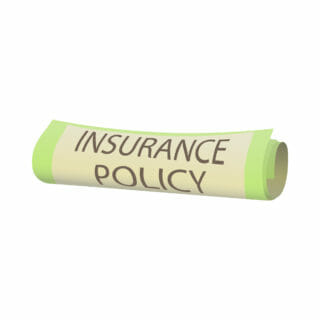The Basics of a Cannabis Insurance Policy
Insurance in the cannabis industry is big business, and business owners need to know what policies are available and what those policies cover. Why? Because in insurance policies, like all other business contracts (e.g. leases), the risk of a business venture is divided between the contracting parties. Your insurance policies are contracts where you pay your insurer to take some of the risks of your business venture away from you – for a fee, of course. (Some insurance companies are better than others at gauging risk and investing their premium funds. Check out some of their ratings here.) Companies that insure cannabis ventures charge an above-average premium to take on above-average risk, though they may be covering less of your business risk than you think is covered.
I know, I know, no one wants to talk, think, or read about insurance, and that includes most lawyers. (I almost fell asleep several times while writing this post, and my brother-in-law who does insurance defense legal work has been asleep at his desk for years.) Insurance agencies and agents tend to get excited about insurance because of the passive income they receive based on their share of premiums you pay month after month, and insurance companies get very excited when they make profitable investments with your premium dollars and pay out as little as possible to insurance claimants as claims. (It’s not personal; it’s business.)

- potential asset seizure and forfeiture of real estate, business accounts, and other tangible business assets by a state or federal governmental entity;
- violation of any federal, state, or municipal law or regulation;
- heightened crime in or near your business;
- the presence of fungi (mold) and other biological substances like viruses and bacteria;
- the transmission of communicable diseases (real or perceived possibility); and
- your incorporation of nuclear energy into the business (No joke. Every cannabis insurance policy I have read includes this, so don’t get too creative with the source of power for your grow lights, ok?)
Broadly speaking, insurance is broken down into general categories based on risk: (1) employee-related liabilities (covered by worker’s compensation coverage and employment practices insurance); (2) injury to people and tangible business assets (covered by commercial general liability insurance); and (3) damage to physical buildings and fixtures (covered by real property casualty insurance). I will only briefly mention: (a) key person insurance, which can be very important in buy-sell agreements among business partners; (b) directors and officers (D&O) insurance, which can be very important to non-employee board members (often called outside directors); and (c) business interruption insurance, which can be very important for any business that needs a regular income stream to remain viable.
Reading and comprehending an insurance policy is extremely taxing. Depending on your initial scope of coverage and the applicable insurance riders (amendments), each contract will be tens or hundreds of pages long. Determining what coverage you have is like starting with a handful of delicious Halloween candy and then watching your kids sneak away one piece at a time until you are left with Mary Janes. Your insurance company will probably include a marijuana risk rider and many other types of riders, each of which omit a part of the business risk you thought your insurance company would cover (in a perfect world if they had your best interests at heart). Generally, you will not discover the impact of these riders until you have an event that you think should be covered by your claim and you start fighting with your insurance company over whether they are obligated to cover your event.
A typical marijuana risk rider will require you to take affirmative steps like:
- Keep all of your finished marijuana stock in a vault or locked safe (this often includes the type of safe, how it is installed, and the minimum weight);
- Install a burglar alarm that is linked to a central response center;
- Install motion detectors; and
- Have a licensed electrician perform or sign off on your electrical work, certifying that you have adequate circuits to handle your business’ gargantuan power needs.
Items that Will Arise in the Life of a Cannabis Company
Truths that I believe are accurate in the insurance context, based on my many years of interacting with business clients:
Many business owners never read their policies.
Insurance contracts are often dozens or hundreds of pages long. They are complicated, and they are not written like other contracts, which makes them worse to read than a normal business contract. This results in many business owners meaning to read the contract but rarely getting beyond the coverage jacket on the first page of the policy.
Many business owners never have anyone on their team read their policies.
Business owners generally intend to (and do) delegate the insurance review and renewal to someone on their executive team, but that rarely results in anyone reading the contract beyond the first page of the policy. Many insurance owners do not want to pay their lawyer to review their policies, so they will often rely on their broker to assure them as to what coverage they have. Because insurance claims arise only intermittently, the importance of the insurance contract seemingly pales when compared to supply and customer contracts that are the lifeblood of the business, so these tend to fall by the wayside until the next annual renewal.
The right insurance broker or agent can be your ally.
First, some terminology. An insurance broker represents an insurance buyer, and an insurance agent represents one or more insurance companies. If you are familiar with real estate, you can analogize to the commercial insurance context. An insurance broker is similar to a real estate buyer’s agent, while an insurance agent is similar to a real estate dual agent who represents both the buyer and the seller in a transaction. Each of these individuals can be helpful to you in the right context with the right motivation. An insurance broker will always be your ally because they work for you and can shop your needs around to various insurance companies. An insurance agent is generally “captive” to the company or companies they represent and has to sell you insurance products offered by those companies, but they are still motivated to sell you a good product to keep your recurring business year after year. In both scenarios, you will not know all of the types of policies that are available, even if you are familiar with the basic insurance policies: commercial general liability, employment practices, workers’ compensation, directors & officers, property casualty, product liability, commercial vehicle, business interruption, and key person insurance. It is better to rely on someone within the industry than try to decipher the purchasing process by yourself.
Insurance companies are not your friends.
I know many insurance agents and brokers, and many are good people who are motivated to provide good service, but there is a reason why companies hire good, experienced law firms to help negotiate with insurance companies when they want to make a claim for a loss against their policy. I also know many lawyers who work for insurance companies doing “insurance defense work” where they fight hard to help their insurance company clients avoid paying out funds to their insured. It is not pretty to be on either side of the table. But you do not want to try to navigate the technical and complex morass by yourself.
Let’s shift from these general points to the topic of insurance riders:
Insurance riders explained.
A cannabis company growing hemp or marijuana will typically obtain a commercial general liability policy in response to a statutory requirement to carry insurance, like this language from Washington:
The licensee shall at all times carry and maintain commercial general liability insurance or commercial umbrella insurance for bodily injury and property damage arising out of licensed activities. The limits of liability insurance shall not be less than one million dollars.
(a) This insurance shall cover such claims as may be caused by any act, omission, or negligence of the licensee or its officers, agents, representatives, assigns, or servants.
(b) The insurance shall also cover bodily injury, including disease, illness and death, and property damage arising out of the licensee’s premises/operations, products, and personal injury.
These broad categories above are, in theory, the items that will arise in the life of a cannabis company, but the ubiquitous insurance riders (contract amendments) chip away at this protection. Your policy will not cover every event on purpose, even if you try to buy the most comprehensive policy you can find. And if you do want to procure a policy that covers every potential event, it will almost always be too expensive for your budget. It is to your benefit to audit your policies and understand what events are and are not covered and know your business well enough to know what events are most likely to arise based upon your business plan.
Cannabis Insurance Policy Exclusions
When auditing your insurance coverage, pay close attention to the insurance riders that appear at the end of most sections of an insurance contract. After reviewing hundreds of pages of insurance policies as part of my due diligence for a recent M&A transaction, I point out the following language from actual insurance policies that may cause the typical cannabis business owner to pause:
- This policy does not cover seeds, seedlings, vegetative plants, flowering plants, or harvested material that is not yet finished stock.
- This insurance does not apply to bodily injury and property damage arising directly or indirectly from alcoholic beverages.
- This [workers’ compensation] policy excludes volunteers and employment practices liability.
- This [workers’ compensation] policy does not cover business owners.
- This policy excludes nutraceutical substances such as essential oils.
- This policy excludes vaporizing devices.
- The insured must notify the company regarding a change of ownership. (This is not, strictly speaking, an exclusion like the others above, but it was significant enough that I wanted to include it here.) This clause becomes relevant in the M&A context and is different from the standard change of control language in other contracts (like bank financing agreements) that could impact whether you decide to do a stock deal or asset deal. A change of ownership impacts the covered company’s experience rating, and insurance companies love any excuse to reassess a company’s risk profile, find an increased risk, and raise a premium as a result.
Attorneys get paid to deal in details. Often business owners believe they are covered by an event when they really are not, but you have to look beyond the insurance coverage jacket and diagram the effect of your insurance riders. This is why we always recommend a comprehensive insurance audit at least once per year.
For more information on the twists and turns of insurance policies, see the following posts:
























